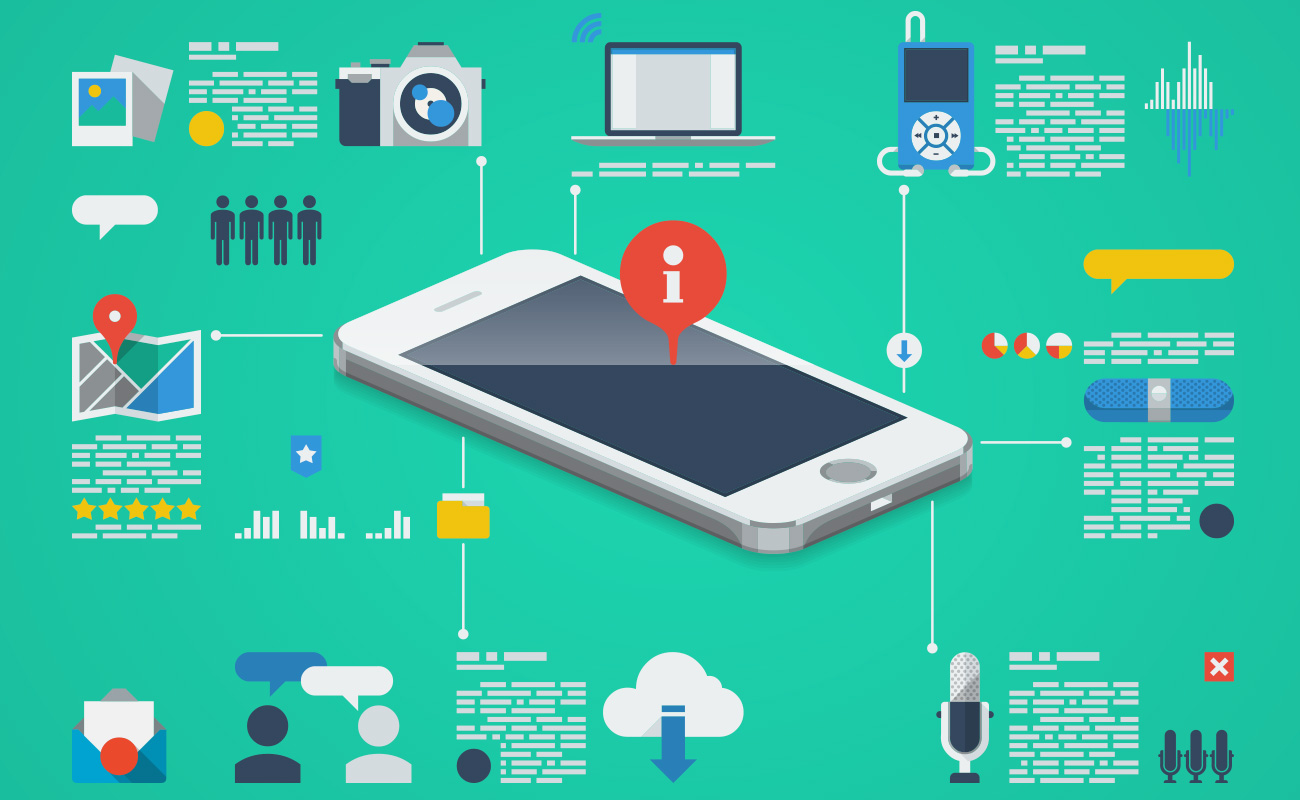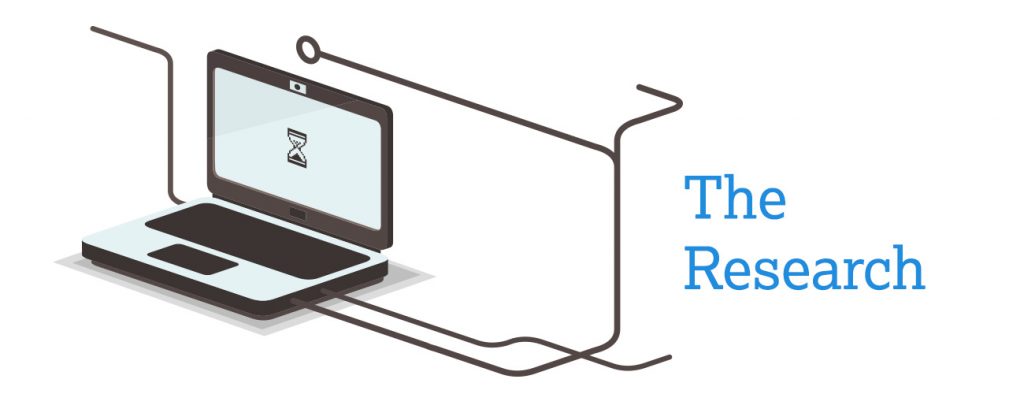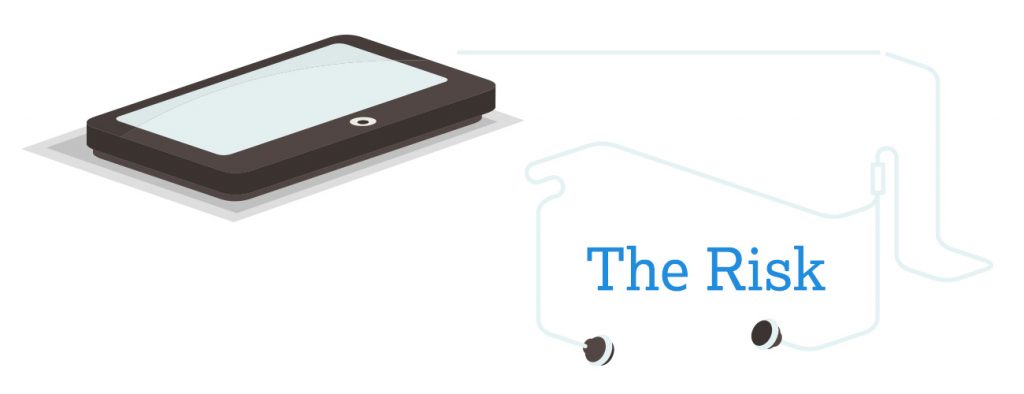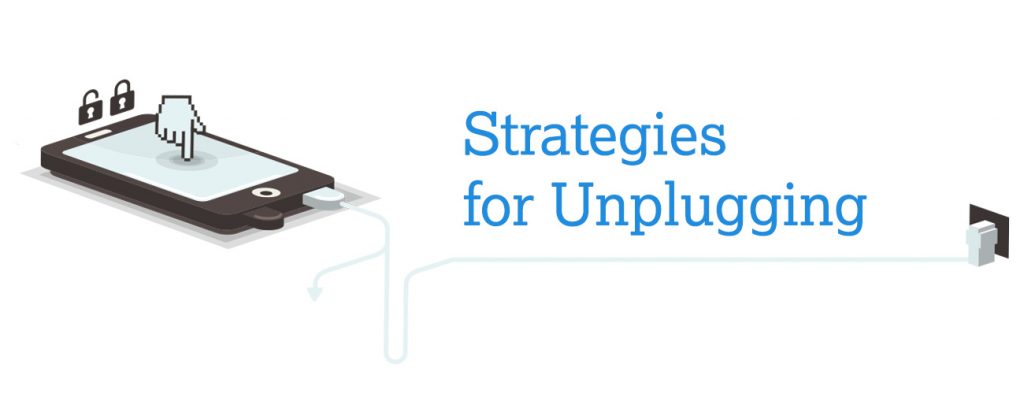Pledge to Unplug: The Health Benefits of Curbing Your Digital Dependence

Go to any restaurant, office, mall, airport, or other public space and chances are you’ll find most people are tethered to an electronic device, whether it’s a mobile phone, e-reader, handheld gaming device, iPad, or laptop. Maybe that’s even the case around your own kitchen table!
There are many advantages to responsible digital connectivity ̶ staying in touch with friends and family, accessing information quickly, keeping abreast of current events or work obligations, and summoning emergency services when needed, to name a few. But overuse of electronics does carry some potential risks to your physical, emotional, and mental health. And many are wondering how much digital connectivity is too much? When does reliance on digital devices escalate to the level of addiction?
The Research

The average American spends nearly half a day in front of a screen, whether it’s a smartphone, computer, tablet, multimedia device, video game, television, or other electronic device. According to a recent audience report from the Nielsen Company, adults in the United States spend about 10 hours and 39 minutes each day consuming media.
Some consider our over-attachment to electronic devices to be an addiction, requiring a digital cleanse, digital diet, or digital “detox” program. And the statistics on cell phone usage seem to bear out that assessment:
- The Pew Research Center has reported that 46 percent of smartphone owners consider their phone something “they couldn’t live without.”
- Research commissioned by mobile company Nokia suggests that people, on average, check their phones every 6.5 minutes, or an average of 150 times during 16 hours of waking time. The Nokia study also found that 25 percent of Americans admit to spending more time online each day than they do asleep.
- As reported by Common Sense Media, 50 percent of teens “feel addicted” to their mobile devices, and nearly 60 percent of their parents agree with that assessment. And the reverse is true. One study revealed that nearly 70 percent of U.K. children believe their parents spend too much time on their digital devices.
- The International Center for Media & the Public Agenda (ICMPA) at the University of Maryland investigated cell phone usage among students in 10 countries. “The World Unplugged” study revealed that a majority of students experienced distress when they tried to forego using their devices for 24 hours.
Special terminology has emerged to describe this phenomenon. The word “nomophobia” (NO MObile PHOne phoBIA) has been coined to describe a person’s fear of not being able to use their mobile phone or other smart device. You can even take a quiz to help you determine whether you are addicted to your smartphone.
The Risks

As with all addictions, there is a price to be paid for this level of connectivity. Some of the potential disadvantages and health risks of excessive use of electronic devices include the following:
- Loss of productivity and increased stress. Researchers have found that the near-constant interruptions and distractions caused by emails and text messages has been found to sap your productivity and creativity and raise your stress level. In fact, this blog has probably taken me far longer to write because I’ve read and responded to multiple emails in the process!
- Sleep disturbances, depression, and dissatisfaction. According to the Pew Research Center, nearly half of cell phone users keep their phones close at hand while they sleep for fear they will miss a text message, call, or update. There’s even a name for this type of fear: FOMO, or “fear of missing out,” defined by the Oxford Dictionary as “anxiety that an exciting or interesting event may currently be happening elsewhere, often aroused by posts seen on social media.” This practice – as well as the resultant exposure to the blue light emitted by such electronic screens – has been linked to poor sleep quality and mental health issues. Research has also shown that accessing social media on electronic devices can elicit feelings of jealousy and loneliness, such as those triggered by comparing numbers of comments or “likes” or viewing others enjoying social activities in which you are not involved.
- Decreased fitness levels and heightened risk of obesity. Most people recognize that “screen time” ̶ time spent in front of an electronic device – is primarily a sedentary activity, often involving long periods of sitting. However, the effects of prolonged or excessive screen time are even more insidious than we realize. For instance, one study published in The Journal of Public Health found a positive correlation between screen time and metabolic syndrome in adolescents. The affected teens showed increases in blood pressure, fasting blood glucose, and triglyceride levels, as well as a larger waist circumference.
- Traffic and pedestrian accidents and fatalities. According to the Centers for Disease Control and Prevention, distracted driving involving the use of mobile phones is at least partially responsible for killing nine people and injuring 1,000 each day. Given that sending or reading a text message takes an average of 5 seconds ̶ which roughly translates to driving the length of a football field while your eyes are closed ̶ it’s amazing that the numbers aren’t higher.
- Barrier to personal relationships, intimacy, and communication. It seems ironic that digital devices, which are so often used to communicate, can actually hinder meaningful communication and relationships when used inappropriately or excessively, a situation sometimes referred to as “technoference” (technology + interference). A “Stress in America” survey by the American Psychological Association found that 44 percent of people who frequently or excessively check email, text messages, and social media sites feel disconnected from their family, even when they’re together. And excessive cell phone use is also taking a toll on romantic relationships, to the point that the term “phubbing” (snubbing a partner by giving your attention to your phone) has come into common use. In some cases, cell phone calls and text messages, especially among dating teens, can also take the form of abuse or threats. According to one study, one third of the teens studied were contacted 10, 20, or 30 times per hour by a partner wanting to know where they were, who they were with, and what they were doing.
Strategies for Unplugging

Many of us feel the need to reconnect with what really matters to us ̶ to be truly present to our life as it unfolds and to the people we care about ̶ but we don’t know where to start. Realistically, the only way you will know how strong technology’s hold on your life is to take a technology holiday, taking planned breaks from your digital devices and setting limits on how often you are checking in. The motivation to unplug has gained momentum in recent years, and there is now a National Day of Unplugging that extends from sundown on the first Friday in March to sundown on the following day.
Can a digital cleanse really work to enrich your life and improve or maintain your health? The research conducted thus far indicates that it can. As with any muscle, our brain needs recovery time to process information and learning, refresh our creativity, and recharge for the next mental or emotional challenge. Plus, the best of life is right in front of us, and those moments can never be recaptured, so make a conscious effort not to spend your one precious life in front of a screen! Here are some strategies for powering-down:
- Make a firm decision to spend your first waking hour without an electronic connection. Use an alarm clock to wake you, not the alarm on your phone. Check in with yourself first.
- Turn off your digital devices an hour earlier at night, and set aside some technology-free hours every weekend. For those of us who are true digital devotees, that means turning all electronics OFF, not just on silent mode.
- Reboot your brain and renew your personal relationships. Dedicate at least a portion of every day for solitude or meditation, and for being present to and connecting to your loved ones, without the distraction of your digital devices.
- Designate certain timeframes during the day for checking email, and turn off push notifications.
- When you take a walk or go for a run or bike ride, leave your cell phone and other electronic gadgets at home.
- When you go on vacation, leave all those electronic gadgets home. If you find that difficult, pick a destination with unreliable internet access.
- If you find yourself wavering in your resolve to unplug, sign up for one of the internet tools that can block your digital access for a time, such as Freedom or Selfcontrol.
There’s a reason all technology devices have an off button. Our connections to other human beings and to nature, not to our digital devices, are what nourishes and grounds us and makes us whole. Take a step now to recapture your life by unplugging periodically from the digital world.
 The Daily Dose
The Daily Dose
Comments are closed.